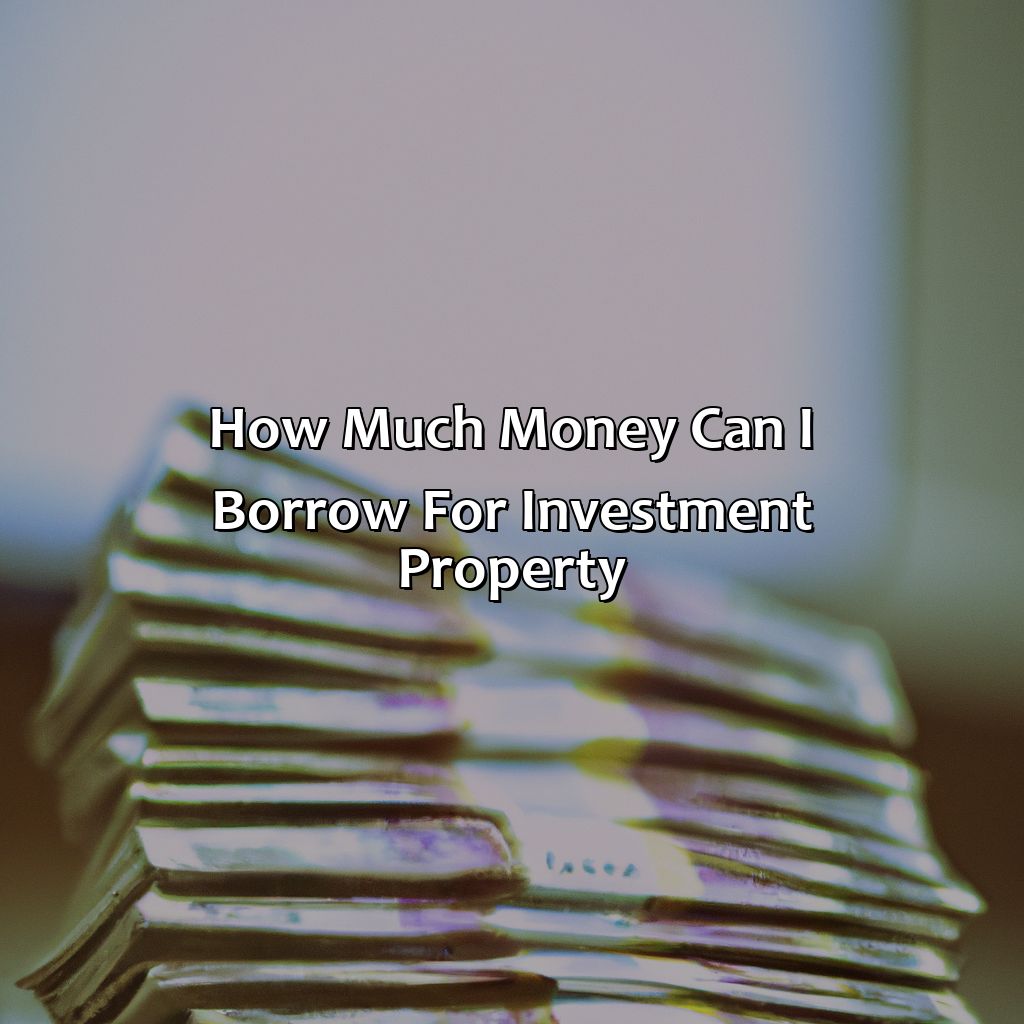How Much Money Can I Borrow For Investment Property?
Key Takeaway:
- The amount of money you can borrow for an investment property depends on several factors, including your income and credit score, loan-to-value ratio, property analysis, and debt-to-income ratio.
- There are several types of loans available for investment properties, including conventional loans, Federal Housing Administration (FHA) loans, Veterans Affairs (VA) loans, and private investment loans. Each type of loan has its own requirements and benefits.
- To determine the maximum loan amount for an investment property, you can use online mortgage calculators and tools, get pre-approved for a mortgage, or consult with a professional mortgage lender or financial advisor to discuss your options.
Do you want to diversify your investments and build long-term wealth? Finding out how much money you can borrow for an investment property can be the first step on this journey. With this guide, you can learn how to calculate your borrowing power and make informed decisions.
Factors influencing loan amount for investment property
Factors That Affect the Loan Amount for Investment Property
Investors who plan to borrow money for their real estate investments must take into account several factors that determine the amount they can actually borrow. Simply put, lenders look at the risks of lending money, and investors must be able to provide assurances that they can pay on time and in full.
The following table shows the primary factors influencing the loan amount for investment property:
| Factors Influencing Loan Amount for Investment Property | Description |
|---|---|
| Equity | Lenders usually offer a maximum of 80% of the property’s assessed value. Therefore, the equity on the property can determine the loan amount. |
| Cash flow | Positive cash flow from the income-generating property can affect the loan’s underwriting and availability. |
| Debt-to-income (DTI) ratio | Calculation of debt and income that lenders use to determine financial eligibility for a loan can impact loan amounts. |
| Creditworthiness | Lenders will review an applicant’s credit score to assess financial risk before extending a loan. |
It’s also essential to consider factors such as the location of the property, investment match, and the type of property when seeking a loan. These factors can further influence the loan amount that an investor can secure. With these in mind, investors can present a solid case to a lender and secure the best loan amount possible.
It’s crucial to make an informed decision when borrowing for investment property. A true story of an investor who failed to consider the critical factors influencing the loan amount is one where the borrower did not have a credit history or enough down payment to secure the desired loan amount. Due to this, the borrower lost their chance to purchase their dream investment property.

Image credits: retiregenz.com by Adam Arnold
Types of loans available for investment property
For those looking to invest in property, there are various loan options to consider.
List of Loan Options:
- Conventional Loans: A standard loan with a fixed interest rate offered by banks.
- Hard Money Loans: Short-term loans secured by real estate, with higher interest rates but less stringent requirements.
- Portfolio Loans: Loans extended by lenders that keep the loans “in-house” instead of selling them to investors.
- Government-Backed Loans: These loans are guaranteed by the government, such as FHA and VA loans.
- Blanket Loans: Used to finance multiple properties under one loan, mainly for investors looking to buy or refinance portfolios of rental properties.
It’s crucial to note that the terms and conditions of each loan vary widely, and investors need to carefully weigh their options before selecting a financing plan that suits their needs.
Back in 2008, the global financial crisis led to a decline in the number of loan options available to investors. However, efforts made to bolster the economy have significantly contributed to the emergence of more loan options for investment property buyers over the years.

Image credits: retiregenz.com by David Arnold
How to determine the maximum loan amount for investment property
Determining the maximum loan amount for an investment property can be a complex process with several factors at play.
Here’s a handy 5-step guide to help you determine your maximum loan amount:
- Assess your financial position: Before applying for a loan, it is crucial to evaluate your current financial situation. This includes your credit score, income, debts, and expenses.
- Consider the type of property: Different lenders may have varying loan policies for different types of investment properties such as residential, commercial or mixed-use.
- Calculate the loan-to-value ratio (LTV): The LTV is the percentage of the property’s value that you can borrow. Generally, most lenders require a minimum LTV of 80% for investment properties.
- Determine the debt-service coverage ratio (DSCR): DSCR is the ratio of cash inflow to debt obligations. Most lenders require a DSCR of 1.25 or higher for investment properties.
- Shop around for the best deal: Compare the rates and policies of several lenders to choose the most favorable loan deal that meets your investment needs and financial goals.
To ensure a successful investment, consider hiring a professional financial advisor. They can help you navigate the complexities of investment property loans and guide you towards appropriate investment decisions.
Take action now and secure the maximum loan amount for your investment property. Don’t miss out on lucrative investment opportunities due to lack of funds.

Image credits: retiregenz.com by Joel Arnold
Five Facts About How Much Money Can I Borrow for Investment Property:
The amount of money you can borrow for an investment property depends on various factors like your credit score, income, and debt-to-income ratio. (Source: Bankrate)
For a conventional loan, lenders typically require a minimum credit score of 620 and a down payment of 20%. (Source: NerdWallet)
The maximum loan-to-value ratio (LTV) for investment properties is usually lower than for primary residences, ranging from 70% to 80%. (Source: The Balance)
Some lenders may require a higher down payment or interest rate for investment properties compared to primary residences. (Source: Investopedia)
It’s important to shop around and compare loan offers from different lenders to find the best deal for your investment property. (Source: Forbes)
FAQs about How Much Money Can I Borrow For Investment Property?
How much money can I borrow for investment property?
The amount of money you can borrow for an investment property depends on various factors such as your credit score, income, other debts, the property value, and the type of loan you choose. Generally, you can borrow up to 80% of the property value, but it’s best to consult with a lender to determine the exact amount.
What types of loans are available for investment properties?
There are several types of loans available for investment properties, such as conventional loans, FHA loans, VA loans, and portfolio loans. Each loan type has its own set of requirements, interest rates, and terms, so it’s best to consult with a lender to determine the best option for you.
Can I use rental income to qualify for a loan?
Yes, you can use rental income to qualify for a loan as long as the rental income is verified by the lender. The rental income must be documented by providing a lease agreement and a rental history for at least two years.
What is the maximum loan-to-value ratio for investment properties?
The maximum loan-to-value (LTV) ratio for investment properties is typically 80%, which means you can borrow up to 80% of the property value. However, some lenders may offer higher LTV ratios depending on your credit score, income, and other factors.
Do I need to have a down payment for investment property loans?
Yes, most investment property loans require a down payment. The down payment amount varies depending on the loan type, lender, and other factors, but it’s typically between 10% and 30% of the property value.
How can I improve my chances of getting approved for an investment property loan?
To improve your chances of getting approved for an investment property loan, you should maintain a good credit score, have a stable income and job history, minimize your debts, save for a down payment, and choose a profitable property. You should also shop around and compare loan options from different lenders to find the best deal.
 Checkout this IRS Loophole
Checkout this IRS Loophole 
